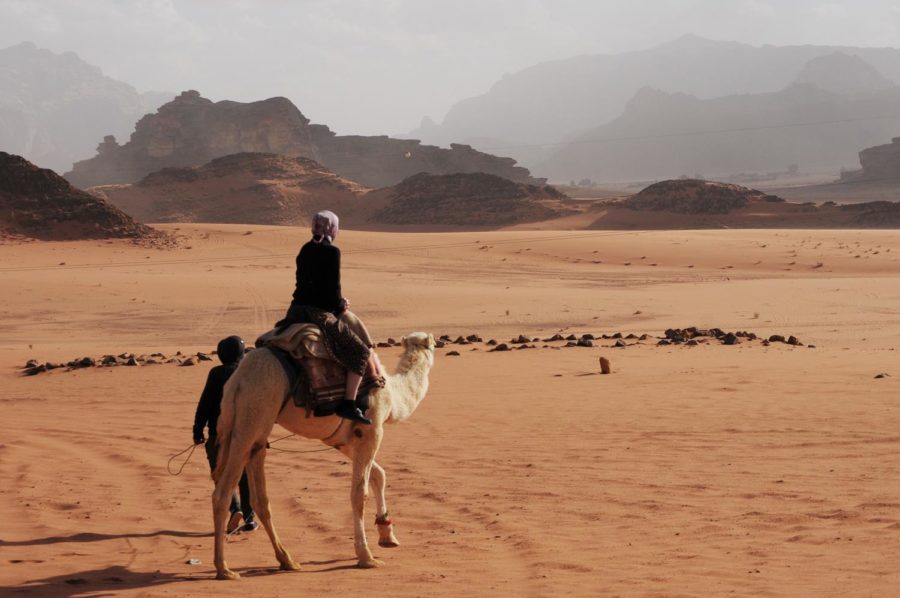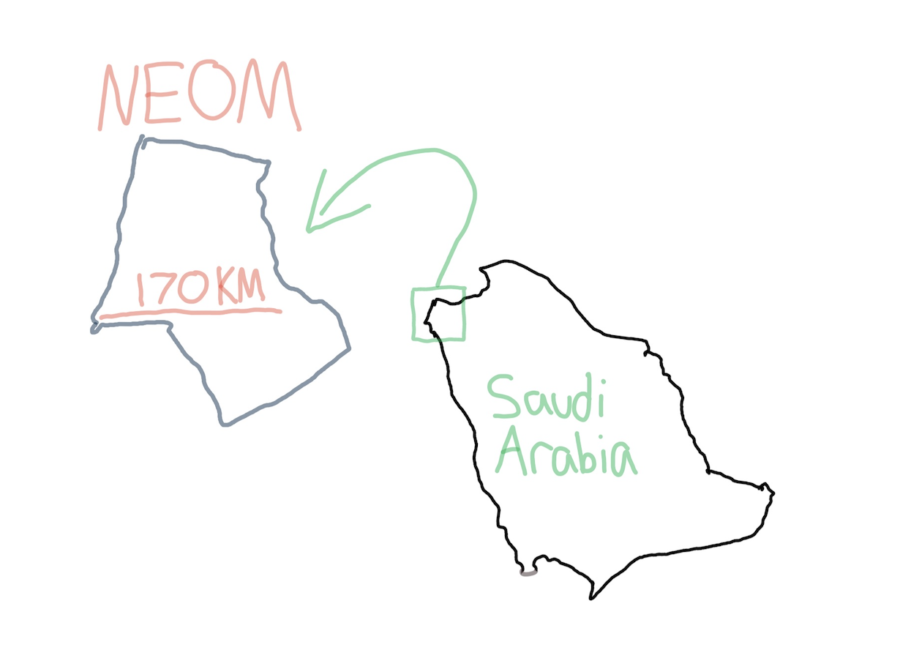Utopian Saudi Arabia: A Campaign of Controversy
Neom, a city the Saudi Arabian Crown Prince and dictator – Mohammed bin Salman – claims will revolutionize urban life as we know it. Now the question is, how will he do it? And how far will he go?
A proposed 170 kilometer-long city, Neom plans to connect the coastal, mountainous and desert regions of Saudi Arabia
Our Earth’s climate is slowly spiraling into disarray, and a star may explode in a few billion years. The notion that Earth, as we know it, may not last, is a crippling concept to most humans. It reminds us of the fragility of our human race, and foreshadows an ultimate doom for our children. Governments bicker, communities sever, anxiety festers, when really we all have the same question in mind: Who is going to save our world?
A few have already stepped up to plate. Elon Musk (billionaire and tech guru) plans to build a rocket, so that humanity can evacuate to the next habitable planet. Jeff Bezos (a second billionaire and tech guru) plans orbiting space stations that house independent climates with entire functioning societies. Both missions outline a new and sustainable future for humanity. But they’re both ready to give up on Earth.
A third idea plans to preserve humanity, and our planet as well. The architect still fits the category of ego-driven billionaire, but without the venture capitalist edge. He is the Crown Prince of Saudi Arabia, Mohammed bin Salman, proposing some of the most radical ideas of the century in one of the most conservative countries on the map.
The idea in question, a city designed to reinvent urban living, is called Neom. It is shaped like a line, stretching 105 miles across a portion of Saudi Arabia’s width. The project prioritizes sustainability: preserving 95% of its enclosed ecosystem, producing zero carbon emissions, and powered completely by clean energy. $500 billion has already been invested.
The city will be separated by three layers. The spine layer begins two tiers below the ground, and is dedicated to an AI powered, high speed train. It travels from edge to edge of the line-shaped city, so that every location is accessible from a 5 minute walk. All commute times within Neom, for its one million projected residents, will be under 20 minutes.
Above the train is the service layer. This will house everyday service facilities (such as schools, medical clinics, and leisure facilities). The infrastructure will be heavily integrated with AI and robotics technologies, so that daily life is ameliorated for all residents. To put this in perspective, robot maids are rumored to be involved.
On the surface is the pedestrian layer. It is comprised of green spaces; there will be no cars or streets. Social reforms will be extended to the city, such as the ability to consume alcohol, and the right of women to function independently. In a country whose 35 year ban on movie theaters was lifted less than five years ago, Neom’s stride towards progressivism deeply contrasts with Saudi Arabia’s past.
Intensely tribal and fiercely authoritarian, Saudi Arabia hosts one of the worst civil rights track records on the planet. Even today, the persecution of women, LGBT+ people, and various religious minorities is very prevalent. But the city of Neom boasts paradise; a hub “that boosts social integration, social values and cultural promotion,” in fact. As for this change of heart, the numbers don’t add up. That is, until you put them into context.
Historically, Saudi Arabia is unsustainable. Its government was pieced together by King Abdulaziz in the early 20th century by bringing together many local tribes. He united them through the oppressive religion of Wahhabism (an orthodox strain of Islam), and through marriage with the daughters of tribe leaders (Wahhabism allowed him multiple wives at one time). Saudi Arabia’s massive oil deposits were also discovered during the King’s time, and have since been the basis for the Saudi economy.
Now, what has resulted from these events? Saudi Arabian society is ruled by an ultraconservative religious sect that severely reproaches on its civilians’ civil rights, a government that is composed of corrupt princes (resulting from his many marriages) who complicate the country’s politics, and a reliance on an industry both dwindling in supply and criticized for its environmental impact. At the end of the day, modern Saudi Arabia is not built to last.
Ergo, its push for sustainability.
Backtracking to Mohammed bin Salman (or MBS), the current Saudi prince has a lot to clean up. And he’s doing it with Neom. The project appears as his manifestation of all the changes he wishes to see in Saudi Arabia — a love letter to his country, if you will. Neom’s liberal ethos is designed to hurl its people out of oppressive Wahhabi customs, and its architecture is designed to hurl its people into sustainable industry.
But for the entire culture and customs of a country to be completely switched by the hands of one man, it implies a particular leader. MBS is a dictator, and his methods are beyond questionable.
The shtick of MBS is like that of all dictators: eliminate dissension at all costs. Motions to silence his adversaries have not been subtle either. A journalist and critic of his throne, Jamal Khashoggi, was killed in 2018 – a murder he orchestrated. One year prior, 400 of Saudi’s most elite (royals, billionaires, government officials) were imprisoned in hotels, and stripped of their wealth – which again, he orchestrated. MBS has seized his own narrative, and outlined himself as the sole controller of Saudi Arabia.
Now, an inquiry for the reforming autocrat: do the ends (utopia) justify the means (tyranny)? This would be an ethics question, except that the ends have yet to be certain. Just where will Neom go?
Two distant futures brush the horizon for Neom: a city designed to uplift the Saudi people, and raise their quality of life, or the other, a corporate engine curated to pockets of the foreign and elite. One is utopia; one is Dubai.
Dubai is a city in the United Arab Emirates (or UAE). It can be defined by three industries: tourism, business, and infrastructure. Ranked as offering the best quality of life in the Middle East, it is important to note that only 15% of the city is native to the UAE. So, in short, Dubai makes its money through expatriates, not through its native population.
Neom’s prospecting industries strongly resemble those of Dubai, and Western critics are often caught up in the parallel. Nora Auburn ’24 said, “The last thing the world needs is another Dubai that keeps the Western billionaires who vacation there satiated, while the voices of actual Saudi citizens are silenced behind the scenes.” Her point is that Neom will cater to expats, and leave the native Saudi Arabian people in the dust. And her view is a common one, but the overall view is misinformed.
One first misnomer concerns population of Dubai. While there is an expatriate skew, the Dubai expat population is not resigned to Western holidayers and foreign scrooges, but consists mostly of working class immigrants. Imported to make up for a lack of UAE natives, expats were needed to build Dubai up from the ground. Neom will not be in this position because their native population is more than enough to construct a city.
A second miscalculation by critics neglects a new policy called Saudization. What Saudization does is outline a baseline percentage of native Saudi workers in every Saudi-based enterprise. In effect, the populus of Neom will have a mandatory native skew. Because of this skew, the resources of Neom are guaranteed to serve the Saudi people. So in the end, skeptics question a reality that is almost baseless. Neom is intended for all parties.
Okay, so assuming that Saudization works, Neom will uplift the Saudi Arabian people. Assuming that the infrastructure can be fully installed, Neom will be the most efficient and sustainable city on the map. And finally, assuming MBS truly has his people in mind as he radicalizes his nation, Neom may host the greatest quality of life in our human history. The dream is grand, but with enough hope and investment, the dream can be pulled off.
For the six million years that humans have been walking this Earth, we have compiled incredible insight on both human behavior and technology. The potential of Neom is that the city uses these developments to redesign civilization from scratch, and into its most efficient form.
Can Saudi Arabia achieve utopia? Only time will tell. But surely humanity has the means to do so. It is enterprises like Neom that remain as some of our only hopes for long-term survival, and it is our duty to see them through.
For the six million years humans have been walking this Earth, we have compiled incredible insight on both human behavior and technology. The potential of Neom is that the city uses these developments to redesign civilization from scratch, and into its most efficient form.
Yasmine Salha is an Editor-in-Chief for ‘The Science Survey.’ She is a proponent of accessible journalism, and loves to simplify complex and controversial...


